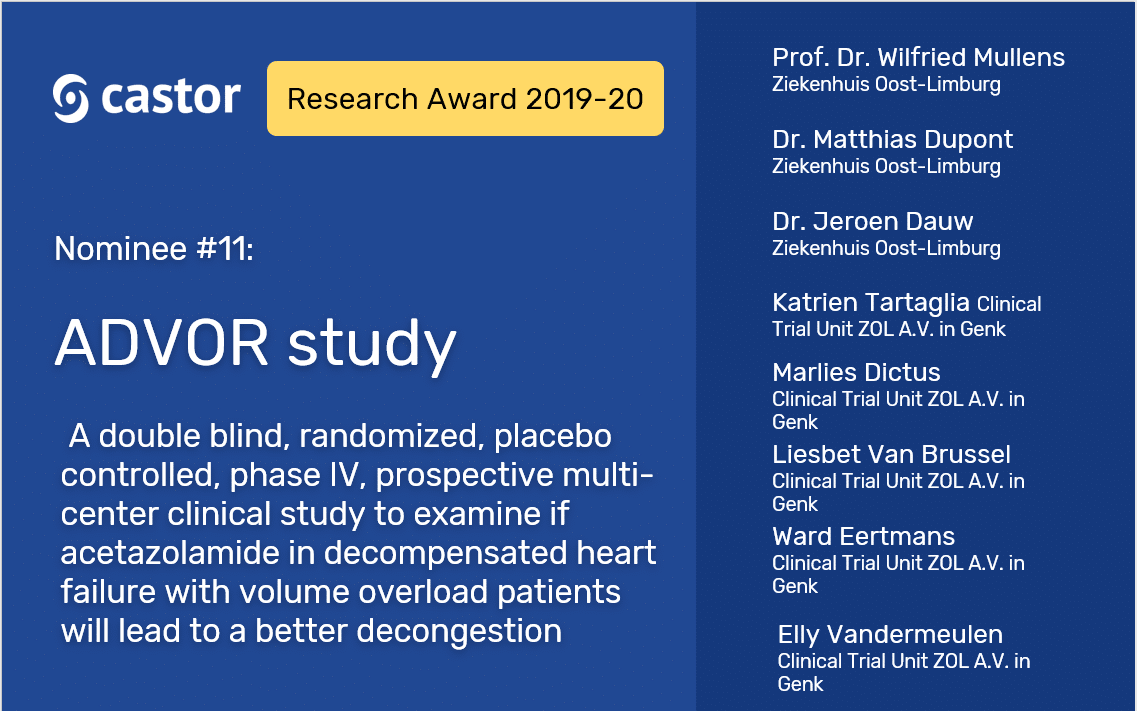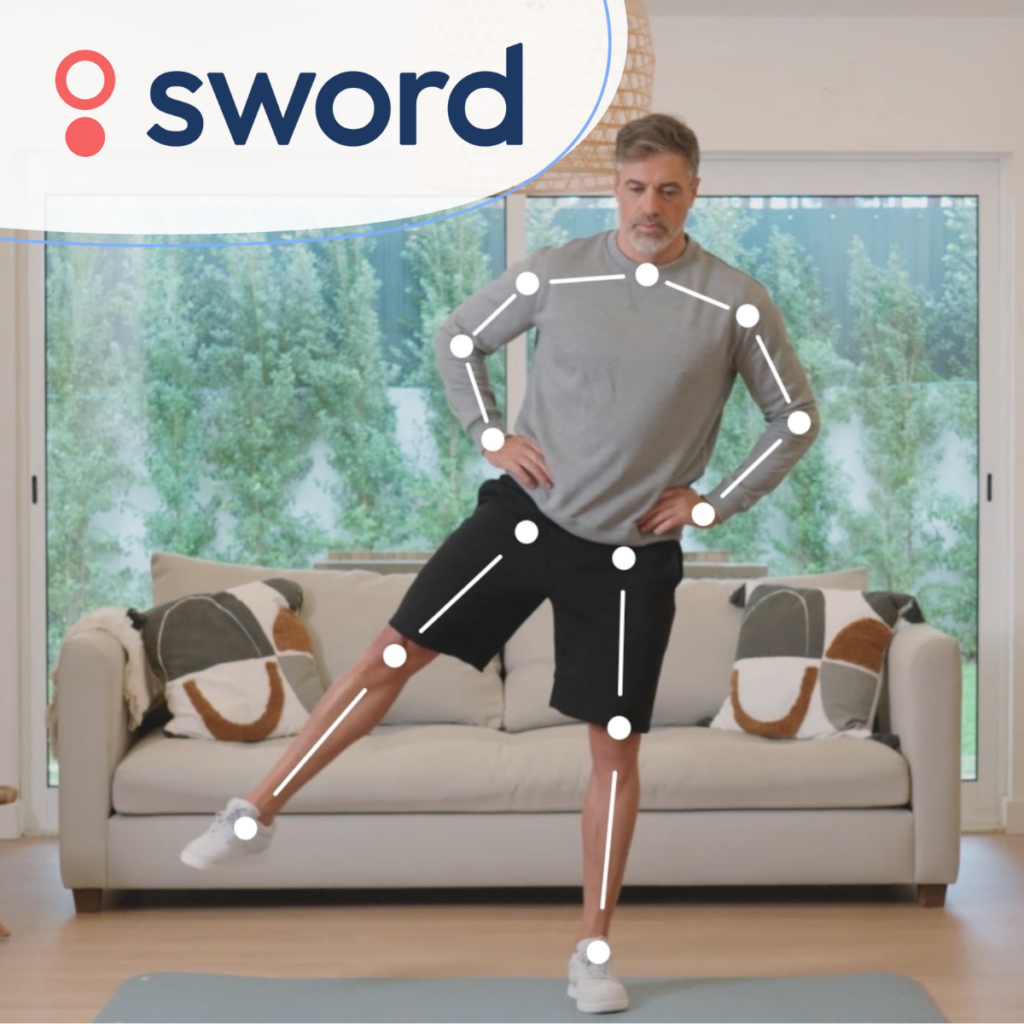Today’s increase in the incidence of heart failure is due to an aging population and therapeutic advances that have lengthened the lives of cardiac patients. Despite advances in treating ambulatory patients who have heart failure, symptomatic relief through an optimal agent, optimal dosing schedule and optimal administration route have yet to be found. Castor Research Award Nominee #11 ADVOR study is researching the use of acetazolamide as a booster of diuretic efficacy.

Research Overview
Both an aging population and modern therapeutic innovations which have prolonged the lifespan of cardiac patients, have led to an increased incidence of heart failure (HF). During the last two decades, important progress has been made in the treatment of ambulatory patients with heart failure with a reduced ejection fraction (HFrEF). Despite these important advances, many patients still are frequently hospitalized with decompensated HF demonstrating most often signs and symptoms of systemic congestion and volume overload, which is associated with a worse outcome. Treatment in these cases focuses mainly on symptomatic relief through the administration of diuretics, although clear evidence on the optimal agent, dosing schedule and administration route is lacking. Loop diuretics, that act at the ascending limb of the loop of Henle in the kidney, are by far the most commonly used agents to achieve decongestion in patients with decompensated HF. However, from a pathophysiological point of view, targeting sodium reabsorption in the proximal tubules of the kidney–rather than solely at the loop of Henle–has several potential benefits in patients with HF. The carbonic anhydrase inhibitor acetazolamide (Diamox®), which is approved for the treatment of mountain sickness, inhibits sodium reabsorption in these proximal tubules. Some studies suggest that adding acetazolamide might be an efficient booster of diuretic efficacy in combinational diuretic therapy with loop diuretics.
About the team
The ADVOR study team is composed of:
- Marlies Dictus: Since June 2018, working as a scientific co-worker in ZOL Genk for the ADVOR study.
- Katrien Tartaglia: Since January 2018, working as a scientific co-worker at the Clinical Trial Unit of ZOL Genk.
- Liesbet Van Brussel: In April 2018 joined the dynamic ADVOR-team at the Clinical Trial Unit of ZOL Genk as a scientific co-worker.
- Ward Eertmans: Since November 2018, working as a scientific co-worker in ZOL Genk for the ADVOR trial.
- Elly Vandermeulen: Since the beginning of 2017, working as a scientific co-worker at the Clinical Trial Unit of ZOL Genk.
The ADVOR study team takes care of the practical aspects of the ADVOR study. The team gets medical input from the scientific team, which consists of two cardiologists with expertise in heart failure (Prof. Dr. Wilfried Mullens and Dr. Matthias Dupont) and one cardiology Ph.D. Fellow (Dr. Jeroen Dauw). All members of our study team perform the same role as a scientific researcher with each member having specific focusses and being responsible for different participating sites: project manager, data manager and on-site monitor.
Study design and methodology
The ADVOR study is a double-blind, randomized, placebo-controlled, Phase IV, prospective multi-center clinical study. 519 patients will be randomized (using permuted block randomization) in either the active group (high dose loop diuretic in combination with Acetazolomide) or the placebo group (high dose loop diuretic in combination with placebo), stratified for center and left ventricular ejection fraction percentage. In total, 24 Belgian centers are actively participating in the ADVOR trial and the trial will soon expand with seven additional sites. Eligible patients receive a maximum of three days of treatment or until decongestion is achieved. Three months after the first study medication is given, a follow-up visit takes place.
Research outcome
The ADVOR study will examine if the addition of acetazolamide to loop diuretics will lead to a better decongestion in decompensated HF patients with volume overload. It is assumed that a more thorough decongestion should translate into fewer readmissions for recurrent decompensation, better renal preservation, and eventually, lower mortality. The primary endpoint is treatment success (decongestion achieved) on the morning of Day 4 without the need for escalating diuretic strategy (doubling loop diuretic dose, the addition of chlorthalidone, or ultrafiltration) on the morning of Day 3.
How ADVOR study team uses Castor
The study uses Castor for the collection of study data and electronic query management. As it is a multi-center study, centers across Belgium can enter the data online. The ADVOR study team reviews the data in the system and also verifies the data are consistent with the source documentation on-site. During this process, manual and automatic queries are managed in Castor EDC. At the end of the study, exporting these data allow the study statistician to do the final analysis.
“None of us has advanced programming skills,” said researcher Marlies Dictus. “So the user-friendly form builder was of great help when building the eCRF.”
In addition:
- The possibility of mandatory and conditional fields assists site users in knowing which data are necessary to complete and avoids the completion of unnecessary data and consequently avoids the creation of queries.
- Reports and the combination with repeated measures give the data manager and site users a clear view of which data should be and have been completed.
- The “User missing” option gives various options to indicate that certain data fields/steps/phases are, for example, not done or not applicable (instead of leaving them empty and generating queries to ask why the field is left empty).
- The automations and validations are useful in relieving the manual work for the data manager.
- The SDV verification tag (used in ADVOR as a data management verification tag) and the data lock feature allow the data manager to have a visual overview of which data have been verified and locked for a certain patient.
- The sign function gives the possibility to electronically sign off the data by the investigator instead of doing administration on paper.
- Summaries help the data manager in the manual review of the data. We combined several summary data fields in “summary forms” per topic. For example, patient summary to verify the consistency of dates and visits, laboratory summary to check for outliers over time.
- Hide phases/steps to document data management findings (for example, summaries, AE coding, documentation of protocol deviations) that are not visible for the site users.
- The import function assists the data manager in entering data in batch (for example, at the end of the study to import the unblinding information per patient from an excel file).
- The export function helps the data manager provide a status of the study, exporting data for the data management review, and as a way to provide the data set to the statistician for final analysis.
Stay tuned on the Castor EDC blog for more 2019-2020 Castor Research Awards nominations. We wish the nominees good luck and smart science—and encourage all researchers to share their projects for the chance to win €3000!



